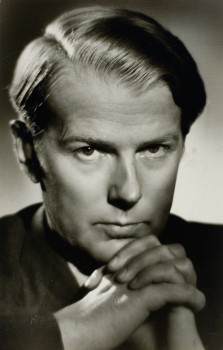Non-fiction
Reflections on light
24 September 2014 | Extracts, Non-fiction
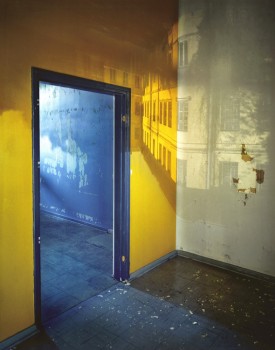
Speaking House #12, 2006. Photo: Marja PIrilä
A camera obscura (‘darkened room’) is the optical device that made photography possible; it is a box – or a room – with a hole in one side. Photographer Marja Pirilä has been using this method as a tool for almost 20 years. The book Carried by Light spans more than 30 years of her photography.
In the book artist and researcher Jyrki Siukonen notes in his essay ‘Eyes and Cameras’ that ‘in photographing spaces Pirilä also depicts people. The dreams continue on the walls of the empty building, as if after the people the house had become like them and were dreaming the dreams itself.’
Photographs and text extracts from Carried by Light by Marja Pirilä (Musta Taide, 2014)
Life: facts and fiction
10 September 2014 | Extracts, Non-fiction
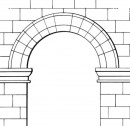 In his latest book, the architect and author Arne Nevanlinna (born 1925) recalls, among other things, his Helsinki childhood and family, the wartime period, his fellow architect Alvar Aalto, various aspects of the spirit of the times, his own work and writings. His first novel Marie was published in 2008. Extracts from Arne. Oman elämän kintereillä (‘Arne. On the trail of one’s life’, Siltala, 2014)
In his latest book, the architect and author Arne Nevanlinna (born 1925) recalls, among other things, his Helsinki childhood and family, the wartime period, his fellow architect Alvar Aalto, various aspects of the spirit of the times, his own work and writings. His first novel Marie was published in 2008. Extracts from Arne. Oman elämän kintereillä (‘Arne. On the trail of one’s life’, Siltala, 2014)
My attitude to my own identity has developed from the unconsciousness of childhood, the uncertainty of early adulthood, the artificial arrogance of middle age and the self-analysis of approaching retirement, to my present situation.
Despite the fact that my first book had some degree of success, it took many books before I felt I was a real writer. The process continued for well over ten years, by which time I was already over eighty. Before that, I thought of writing as a way to pass the time and combat loneliness. I imagined that I was writing for a living, and that I lived in order to write. I was in the fortunate position of not to think about my income.
Even then, I knew that this was just a catchphrase for the event that it occurred to someone in the audience to ask me why I wrote. That never actually happened. No wonder, as both question and answer would have been unnecessary, to put it mildly, and stupid, to put it harshly. More…
Instant erudition, or, who are you kidding?
2 September 2014 | Articles, Letter from the Editors, Non-fiction
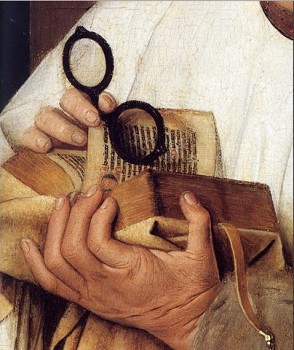
Time to read? Detail from Madonna with Canon van der Paele by Jan van Eyck (1439. The Groeninge Museum, Brugge). Wikipedia
In a recent ‘Saturday essay’ in the Helsingin Sanomat newspaper (9 August) journalist Oskari Onninen ponders the moral dilemma of pretending to be erudite. For example, who has the time to read books these days? ‘The Woolfs remain unread, Bergmans unwatched’, Onninen writes.
Our consumerist lifestyle forces us to follow the trends of ever-expanding, multiplying forms of entertainment. However, it is apparent that the need to know about culture in order to pass as a cultured, well-informed citizen still exists, to some extent at least.
According to Onninen, there is less and less time for unproductivity. ‘If one looks for measurable cost-benefit results from the reading of heavyweight fiction, the act of reading will certainly not always be worthwhile.’ Consuming art (reading books, going to art exhibitions, watching plays) requires time and effort, and how productive is that? More…
Rooms with views
21 August 2014 | Extracts, Non-fiction
Most of us live in box-shaped houses; the long-prevailing laws of modernist architecture relate to cubes, geometry and masses. Together with an architect, artist Jan-Erik Andersson designed a leaf-shaped house for himself. Could it be both art and architecture? In his new book he takes a look at non-cubical buildings in Finland and beyond, attempting to define what makes ‘wow factor architecture’: good architecture requires freedom from strict aesthetic rules.
Extracts from the chapter entitled ‘Det inre rummet’ (‘The inner room’) in Wow. Åsikter om finländsk arkitektur (‘Wow. Thoughts on Finnish architecture’, Schildts & Söderströms, 2014)
I remember from my childhood in the 1960s how my brother and I each lay in our beds in a little room late in the evening and stared up at the ceiling, onto which the lights from cars outside cast patterns. The patterns were constantly changing, they were like the doors of imagination onto eternity. Along with the hum of the engines they lulled me into a kind of half-stupor.
During the days the floor of the room grew to a town as we threw ourselves into a world of adventures and sped around with Formula 1 cars. Or the waste-paper bin was squeezed into a corner between the bookshelf and the wall, and the room took on the dimensions of a basketball court.
When defining a room it is difficult to distinguish between the outer, physical room, and the inner room formed by your consciousness. More…
The many arms of Krishna
14 August 2014 | Extracts, Non-fiction
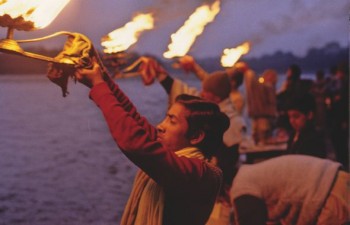
A feast by the Ganges. Photo from Pirjo Honkasalo’s film Atman
Cinematographer, camerawoman and director Pirjo Honkasalo has travelled and filmed widely – Japan, Estonia, India, Chechnya, Ingushetia, Russia – and her documentary films in particular have gained fame. American film critic John Anderson interviews Honkasalo; they talk about her documentary film Atman (1996) about a pilgrimage in India.
Edited extracts from Armoton kauneus. Pirjo Honkasalon elokuvataide (‘Merciless beauty. The film art of Pirjo Honkasalo’, Siltala, 2014; translated from English into Finnish by Leena Tamminen)
You can almost catch a whiff of the Ganges watching Atman [Hindu term, ‘self’], a documentary film in which religious pilgrimage, devotion, exhilaration and hysteria compete with tormented bodies, physical mortification, corpses, pollution and the acrid smoke of ritual cremation for domination of the viewer’s senses. The fact that it won the top prize at the International Documentary Film Festival Amsterdam in 1996 proves there is, if not justice, then good taste in the world. With all due respect to her previous work, Atman signified the full manifestation of Honkasalo’s genius.
What is it about? Eternity. Also, Jamana Lal: a member of the low-caste of Baila, a wifeless, crippled devotee of Lord Shiva whose mother has died, and who must – according to Hindu tradition – take her ashes from the ostensible mouth of the Ganges to the foothills of the Himalayas. More…
Animal magic
3 June 2014 | Extracts, Non-fiction
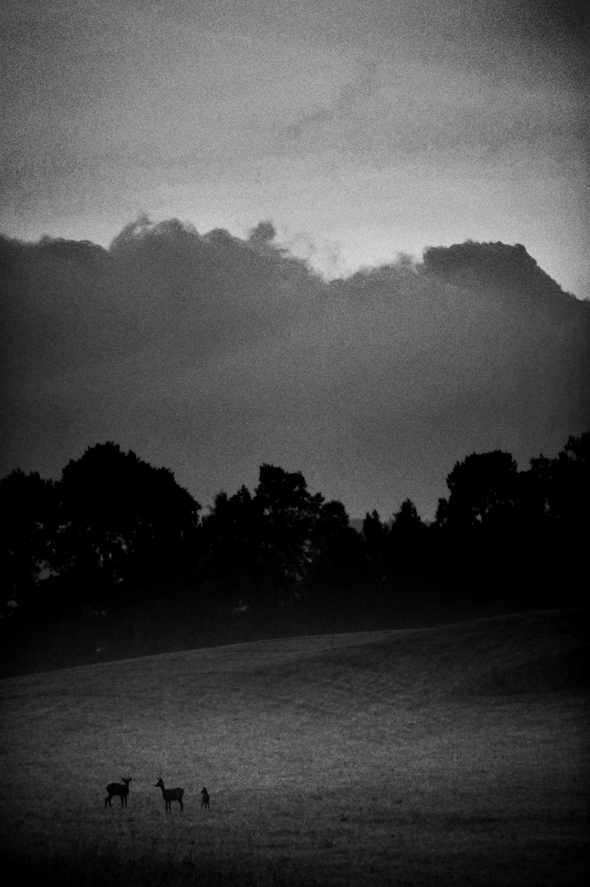
Roe deer, Sweden. Photo: Mats Andersson
A day in the life of an elk, of a lynx? Nature photographers venture into the depths of forests, in pursuit of the inhabitants – predator and prey, mythical and real. Photographs from Kohtaamisia (‘Encounters’), by Mats Andersson and Heikki Willamo, text by Willamo (Maahenki & Musta Taide [Black Art], 2014)
The feelings in our dreams. They well from depths – from those layers of awareness that the mind does not shackle. In sleep we handle and organise the events of our lives in a way which is impossible when awake, when we are conscious of ourselves and our limitations. That is why animals can come into my dreams as friends, equal partners, like me, and therefore I so often dream of having their abilities and skills.
When awake we think all the time. We think about past events and worry about the future or dream of something better. Very seldom do we live in the moment. Photographs are passing moments, often only a thousandth of a second long, but sometimes lasting minutes or even hours. In finished photographs the beholder can see much more – he adds his memories or dreams of the future. The picture-taking moment vanishes, something else comes in its stead. More…
Journalist 3.0
22 May 2014 | Non-fiction, Tales of a journalist
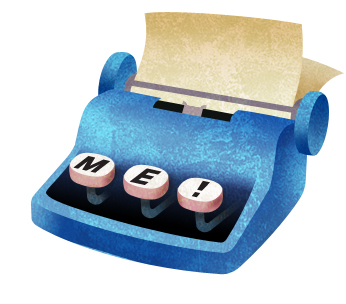
Illustration: Joonas Väänänen
As the world becomes more and more difficult to understand, the media, strapped for cash and forced for reduce expenses, sack their expert writers. Jyrki Lehtola assesses the new breed of cut-price journalists
Some time in the distant past it was possible for a reader to reflect that here was an educated journalist writing pithily. It would be nice to know more of his or her thoughts.
There used to be talk of such concepts as the ‘objective truth’, and editors shunned talking about themselves, or even speaking or writing in the first person. There was just the world, which the journalist, the conduit of truth, conveyed to the public.
Now, although most of us would prefer to know nothing about journalists and their private lives, journalists have brought their lives strongly into the public arena. Objectivity is dead; there are merely millions of subjects who perhaps share the same experiences, perhaps not, and, misled by some idealised concept of community, we are the beneficiaries of journalists writing about what it’s like to be a mum, how challenging life as a mother and journalist can be. More…
Beautiful books
15 May 2014 | Letter from the Editors, Non-fiction
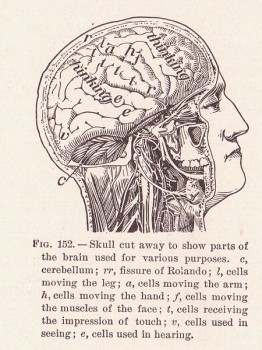
Brains at work. (Alvin Davison, ‘The Human Body and Health’, 1908) Wikimedia
A precise translation of the word non-fiction doesn’t exist in the Finnish language. Fiction is kaunokirjallisuus (a word invented by two diligent scholars, D.E.D. Europaeus and A. Varelius in mid-19th century for their Swedish-Finnish dictionary) – and a pretty word it is: kauno- is derived from the word kaunis, beautiful, beauteous. Non-fiction translates as tietokirjallisuus: literally, ‘literature of knowledge’.
Recently the status of Finnish non-fiction has been discussed in various media. Authors of non-fiction, as well as a number of readers, have been worried about diminishing sales, a decline in interest among both the general public and publishers, a lack of professional publishers’ editors. In a small-language area producing and profitable publishing ‘literature of knowledge’ is financially hard. More…
Updated, alive
8 May 2014 | Non-fiction, Reviews
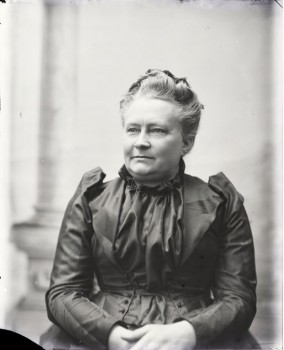
Minna at 50. The Finnish flag is flown on her birthday: 19 March has been named the Day of Equality. Canth also flies on the tail of one of the aircrafts of the Nordic airline Norwegian: the fleet carries portraits of ‘heroes’ and ‘heroines’ of four Nordic countries (the other Finn is the 19th-century poet J.L. Runeberg). Original photo: Viktor Barsokevich / Kuopio Museum of Cultural History
Herkkä, hellä, hehkuvainen – Minna Canth
[Sensitive, gentle, radiant – Minna Canth]
Helsinki: Otava, 2014. 429 pp., ill.
ISBN 978-951-1-23656-6
€40.20, hardback
There are two sure methods of preserving the freshness of the works of a classical author in a reading culture that is increasingly losing its vigour.
The first is to give a high profile to new interpretations of them, either in the form of scholarly lectures or of artistic re-workings, such as dramatisations, librettos or film scripts. Another unbeatable way to keep them alive as a subject of discussion is an updated biography, through which the author is seen with new eyes.
Minna Canth (1844–1897) is now celebrating her 170th anniversary, and she is fortunate in both respects. Having begun her literary career in the late nineteenth century, she still continues to be Finland’s most significant female writer.
Her influence on the role of women in society and, in particular, her promotion of girls’ education, is the cornerstone of Finland’s social equality. In the twenty-first century Canth’s plays are still receiving new interpretations, and they have also been made into operas and musicals. (Read her short story, ‘The nursemaid’, here.) More…
Rock or baroque?
30 April 2014 | Extracts, Non-fiction
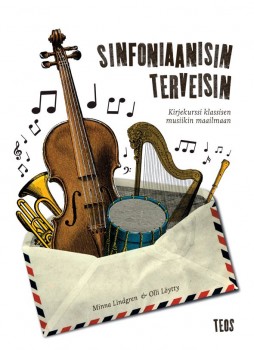 What if your old favourites lose their flavour? Could there be a way of broadening one’s views? Scholar Olli Löytty began thinking that there might be more to music than 1980s rock, so he turned to the music writer Minna Lindgren who was delighted by the chance of introducing him the enormous garden of classical music. In their correspondence they discussed – and argued about – the creativity of orchestra musicians, the significance of rhythm and whether the emotional approach to music might not be the only one. Their letters, from 2009 to 2013, an entertaining musical conversation, became a book. Extracts from Sinfoniaanisin terveisin. Kirjekurssi klassisen musiikin maailmaan (‘With symphonical greetings. A correspondence course in classical music’)
What if your old favourites lose their flavour? Could there be a way of broadening one’s views? Scholar Olli Löytty began thinking that there might be more to music than 1980s rock, so he turned to the music writer Minna Lindgren who was delighted by the chance of introducing him the enormous garden of classical music. In their correspondence they discussed – and argued about – the creativity of orchestra musicians, the significance of rhythm and whether the emotional approach to music might not be the only one. Their letters, from 2009 to 2013, an entertaining musical conversation, became a book. Extracts from Sinfoniaanisin terveisin. Kirjekurssi klassisen musiikin maailmaan (‘With symphonical greetings. A correspondence course in classical music’)
Olli, 19 March, 2009
Dear expert,
I never imagined that the day would come when I would say that rock had begun to sound rather boring. There are seldom, any more, the moments when some piece sweeps you away and makes you want to listen to more of the same. I derive my greatest enjoyment from the favourites of my youth, and that is, I think, rather alarming, as I consider people to be naturally curious beings whom new experiences, extending their range of experiences and sensations, brings nothing but good.
Singing along, with practised wistfulness, to Eppu Normaali’s ‘Murheellisten laulujen maa’ (‘The land of sad songs’) alone in the car doesn’t provide much in the way of inspiration. It really is time to find something new to listen to! My situation is already so desperate that I am prepared to seek musical stimulation from as distant a world as classical music. I know more about the African roots of rock than about the birth of western music, the music that is known as classical. But it looks and sounds like such an unapproachable culture that I badly need help on my voyage of exploration. Where should I start, when I don’t really know anything? More…
Online, offline?
17 April 2014 | Articles, Non-fiction
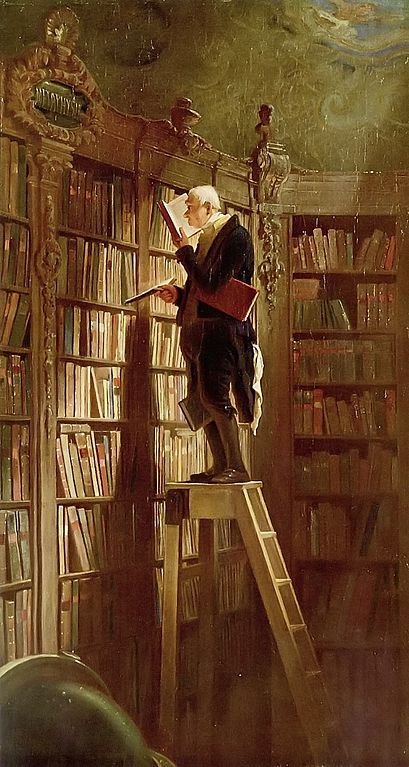
‘The bookworm’ (old-fashioned) by Carl Spitzweg, ca. 1850. Museum Georg Schäfer. Photo: Wikimedia
Ebooks are not books, says Teemu Manninen, and publishers who do not know what marketing them is about, may eventually find they are not publishers any more
At least once a year, there is an article in a major Finnish newspaper that asks: ‘So, what about the ebook?’ The answer is, as always: ‘Nothing much.’
It’s true. The revolution still hasn’t arrived, the future still isn’t here, the publishers still aren’t making money. In Finland, the ebook doesn’t seem to thrive. The sales have stagnated, and large bookstores like the Academic Bookstore are closing their ebook services due to a lack of customers.
Why is Finland such a backwater? Why don’t Finns buy ebooks?
The usual explanation is that Finland is a small country with a weird language, so the large ebook platforms like Amazon’s Kindle and Apple’s iBook store have not taken off here. Another patsy we can all easily blame is the government, which has placed a high 24% sales tax on the ebook. If that isn’t enough, we can always point a finger at the lack of devices and applications or whatever technical difficulty we can think of. More…
The almost nearly perfect travel book
4 April 2014 | Articles, Non-fiction
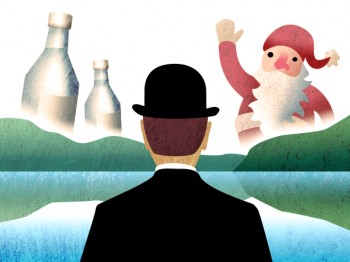
Illustration: Joonas Väänänen
The question of what foreign people think of us Finns, and Finland has always been a particularly burning one in these latitudes: a young nation, a small people. Can we be as good as bigger and wealthier nations? Tommi Uschanov reads a new book on the Nordic countries published in England, keeping a sharp eye on what is being said about…. Finland, naturally
When an article based on The Almost Nearly Perfect People: The Truth About the Nordic Miracle by Michael Booth was published last January in the London Guardian, there was a nationwide outcry in Finland. ‘Finland being bashed in the British media,’ one tabloid headlined grandiosely, while a sober financial paper spoke of ‘a broadside full of stinky stuff’. It takes a re-reading of the article after having read the book to understand why. To create an artificial atmosphere of controversy, the article is lop-sidedly critical of Finland in a way which the book goes out of its way to avoid.
The Almost Nearly Perfect People belongs in a by now time-honoured genre within English letters: the humorous encomium to a host culture by an expatriate – or immigrant, as we hosts impolitely insist on calling them. The only difference is that Michael Booth, a British food and travel writer, does not discuss only Denmark, where he has lived for a decade, but visits each of the other four Nordic countries in turn. More…
Breadcrumbs and elephants
27 March 2014 | Essays, On writing and not writing

In this series, Finnish authors ponder the pros and cons of their profession. Alexandra Salmela operates in two languages, her native Slovakian and Finnish, which has become her literary language. Adventure and torture alternate as she attempts to shape reality into writing
I had started to write before I knew how. With fat wax crayons, in big stick-letters, I scratched my stories in old diaries. There were lots of pictures. From the very beginning, I wrote both poetry and prose. At 11 I didn’t finish my great sea-adventure novel, but at 12 I was already writing my memoirs. They, too, somehow remained unfinished.
Writing is… I wanted to write fun, but in the end I’m not quite sure about that. Writing is adventure and liberation and terribly hard work. Torture of the imagination and the pale copying of real events. Reading is a way to escape reality and at the same time a route to the sources of reality. By writing, you can shape reality in your own image: it’s your own character fault if the result is ugly and depressing.
If I were to write a pink world, it would be so sugary that it would make everyone sick, me and other people. More…


